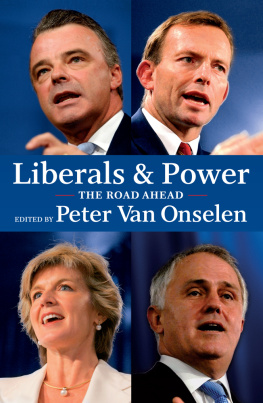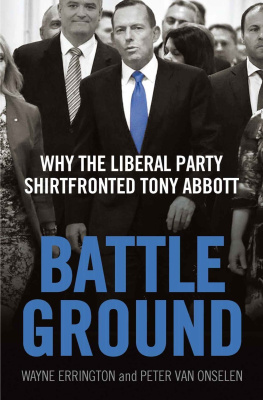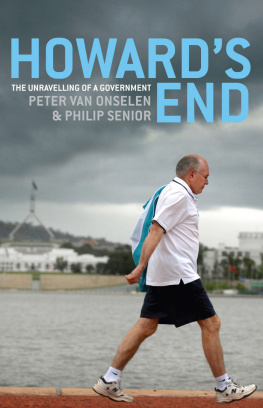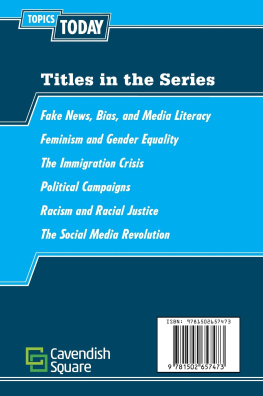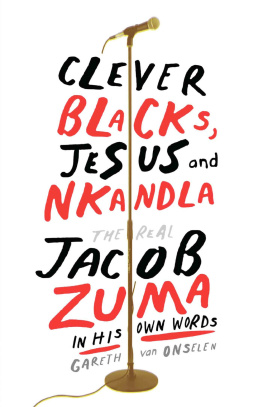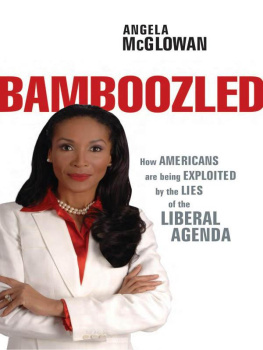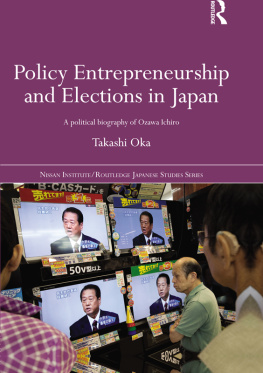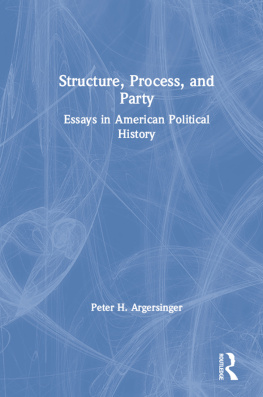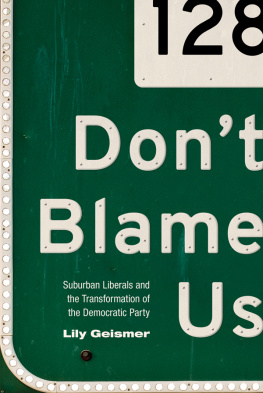Liberals and Power
Liberals and Power
The Road Ahead
Edited by
Peter van Onselen
MELBOURNE UNIVERSITY PRESS
An imprint of Melbourne University Publishing Limited
187 Grattan Street, Carlton, Victoria 3053, Australia
mup-info@unimelb.edu.au
www.mup.com.au
First published 2008
Copyright in this collection Peter van Onselen, 2008
Copyright in the individual pieces remains with their respective authors
Design and typography Melbourne University Publishing Ltd 2008
This book is copyright. Apart from any use permitted under the Copyright Act 1968 and subsequent amendments, no part may be reproduced, stored in a retrieval system or transmitted by any means or process whatsoever without the prior written permission of the publishers.
Every attempt has been made to locate the copyright holders for material quoted in this book. Any person or organisation that may have been overlooked or misattributed may contact the publisher.
Text design by Alice Graphics
Cover design by Andrew Budge, Designland
Typeset by TypeSkill, Victoria
Printed by Griffin Press, SA
National Library of Australia Cataloguing-in-Publication entry
Liberals and power : the road ahead / editor, Peter van Onselen
9780522855906 (pbk.)
Bibliography.
Liberal Party of Australia
Liberal Party of AustraliaPolicies.
Australia. ParliamentElections2007.
Political campaignsAustralia.
AustraliaPolitics and government21st century.
Van Onselen, Peter.
324.29405
Introduction
Peter van Onselen
On 24 November 2007 the Liberal Party of Australia found itself in a position it had never before been in. Defeated at the federal election, it was also out of power in every state and territory. The highest ranking elected official was Campbell Newmanthe Lord Mayor of Brisbane. A veneer of optimism pervaded former Howard government ministers as the Party entered what would have to be its darkest days at any time since Robert Menzies founded it in 1944. But the road back to government could be a long one, and in the modern age of professional politics the Labor Party will be able to use all the trappings of incumbency to make returning to government that much harder for the Liberal Party.
Much has been written since the election claiming that the Liberal Party should have forced Howard out and gone to the polls with Peter Costello as leader. At one level, John Howards defeat makes this observation a truismif defeat is the ultimate failure, Costello could not have done worse. However, it is doubtful whether Costello would have done any betterand entirely plausible that he would have presided over an even larger defeat. It is difficult not to conclude that Howard remained a significant electoral asset to the Coalition, even though his age and longevity in office contributed to voter fatigue with the government. Despite the campaign difficulties the Liberal Party faced, the many constituencies Howards decision-making had offended over the years, the betrayal felt by sections of the Howard battlers over the WorkChoices legislation and the leadership tensions with Costello, Howard left office with a satisfaction rating near 50 per cent, higher than his partys primary and two-party-preferred vote, and the highest of any defeated prime minister in Australian history.
It may well be that a long-term decline in support for the Liberal Party was masked at the federal level by Howards popularity. He managed to attract support in electorates held by Labor at a state level with double-digit margins. It is tempting to put the current struggles of the Liberal Party federally down to a honeymoon for Kevin Rudd as the new prime minister, but the truth is that Howards significant personal vote had been propping the Party up for some timewithout it, the Liberals situation now is far more challenging.
None of this excuses Howards failure to judge his optimal retirement date. He didnt give the Liberal Party the chance to find out if another leader could replace him and succeed on the government benches. As Howard himself said on election night, it is he who must take responsibility for the campaign failure and, indeed, for the governments defeat. His mantra that he would serve as prime minister so long as his colleagues wanted him to was a flawed construct. By definition, it meant he would depart only when he had overstayed his welcome. In the end, the public had to do the job for the Liberal Party.
One criticism that can be levelled at Howard is that he did not prepare his Party for life after his departure. Incumbency would have helped the Liberals deal with a post-Howard era. By losing an election as leader and leaving behind a team of MPs used to following his every desire, Howard left the Liberal Party at its lowest ebb intellectually and competitively, and out of power in every state and territory.
Liberals and Power examines a range of challenges that the Liberal Party faces in the coming years. It draws together some of the finest minds of liberal and conservative thought inside and outside the Liberal Partys parliamentary ranks. Part I offers a frank and deliberate evaluation of the Howard government by Robert Manne, Tony Abbott and George Brandis. Manne, one of Australias leading public intellectuals, is a strong critic of the Howard government, despite publicly admitting to having voted Liberal in 1996. He casts a critical eye over the direction the Liberal Party took under Howard in the key policy areas of climate change and the war in Iraq. He also examines the popular conservatism of the Howard years, and the damage it has done to the Liberal Party brand. Manne gives a frank assessment of what it would take for him to once again vote Liberal.
Tony Abbott has long been considered one of the foremost thinkers of the parliamentary Liberal Party team. A Rhodes Scholar, one of the key ministers from the Howard government and a close friend of the former prime minister, he is well placed to provide an intellectual defence of the Howard years. He reminds readers of the good the Howard government did, applying a pragmatic yardstick to the governments many achievements. Abbott explicitly rejects the criticisms of the left that Howard played to the lowest common denominator and took the populist route.
Senator George Brandis, a senior figure from the moderate wing of the Liberal Party, is generous in his praise of Howard while simultaneously identifying areas of policy he believes the Party needs to re-evaluate. Brandiss essay is courageous in its criticisms and bold in its suggestions for future party direction.
Whatever the policy prowess of the Howard government, the task of developing ideologically consistent policies will be more difficult now that the Liberals are in Opposition. Australian politics has traditionally had a two-party system consisting of the Labor Party on the left and the non-Labor parties on the right. Since World War II the right of politics has been neatly held together by the Menzies Liberal Party. However, the traditional reasons for non-Labor forces to come together may now be waning. As Rudd embarks on fiscal conservatism as a guiding principle to governance, it is sometimes hard to see what conservatives and moderatesliberalshave in common. If economic issues are broadly agreed upon, such as keeping the budget in surplus and maintaining the independence of the Reserve Bank, policy differences between the parties may be sharply defined in the social policy and social justice areas. On such issues Liberal moderates and conservatives often disagree. The essays in Part II show how broad the Liberal Party church can be.

